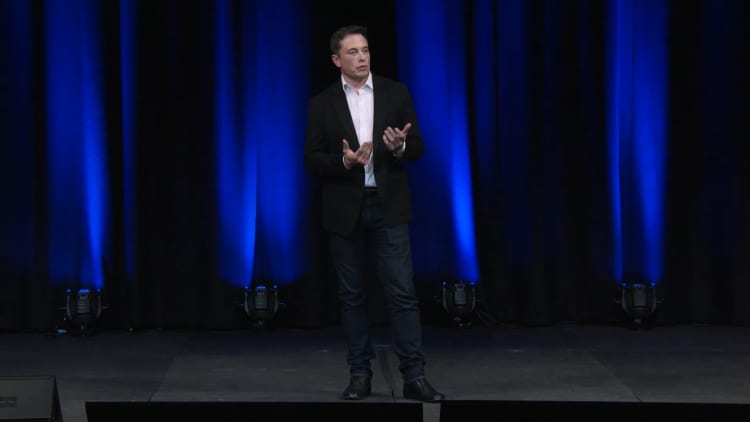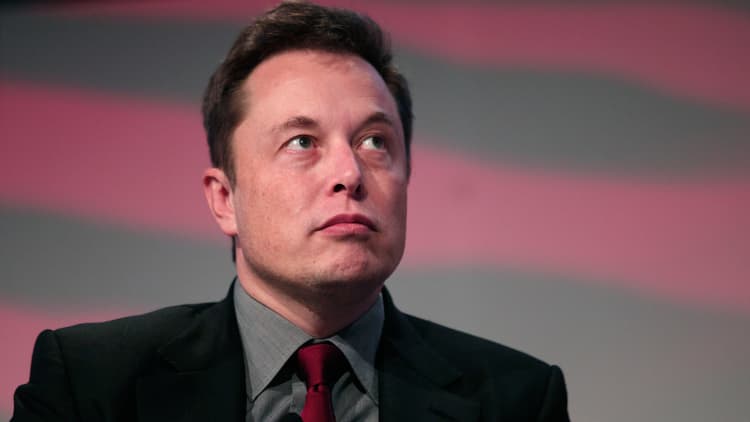According to the World Economic Forum, women around the world are not expected to reach full economic parity with men until 2234 — or roughly 217 years from now.
That means that a future that might once have seemed like an episode of the Jetsons could be reality before true gender pay equality is.
Futurist Glen Hiemstra, an innovation expert and founder of Futurist.com, tells CNBC Make It that in 200 years, we should expect a largely robotic workforce, driverless air taxis and the spread of indoor farming, to name just a few changes.
Hiemstra is optimistic that the global gender wage gap will close sooner than WEF's current prediction: "The further out you look, the more choice you have to create a future you prefer, rather than merely adjusting," he tells CNBC Make It.
In the meantime, here are 10 enormous ways the world is predicted to change, before the gender wage gap closes:
1. Space tourism will be common

For $250,000 a person, Richard Branson's space travel company Virgin Galactic plans to send tourists to the edge of the Earth's atmosphere aboard the SpaceShipTwo VSS Unity. As of Branson's last estimation, he hopes to personally travel to space in sometime this year, with regular customers to follow soon after.
For the price of a plane ticket, SpaceX CEO Elon Musk also plans to transport passengers from New York to Paris in 30 minutes and almost anywhere on earth in under 60 minutes using his rockets.
Though Hiesmtra says achieving commercial space flights in 10 years may be too optimistic, we can expect early settlers on Mars in 20 years, with larger numbers of settlers in 40 years.
2. Mars will be colonized by humans

Picture this: glass domes, a power station and an assortment of basic living fundamentals. Those are the basics Musk says he needs to launch his human colony on Mars.
The SpaceX BFR rocket system is expected to make short trips to Mars as soon as 2019. The company intends to send cargo for the Mars colony by 2022 and people in 2024.
Flights on the reusable BFR rocket lineup will cost somewhere between $5 and $6 million.
3. Communication through telepathy

Former Facebook, Oculus, Google[x] and Intel engineering executive Mary Lou Jepsen, founder of Openwater, wants to make it possible to transmit your thoughts to a computer or to another person just by thinking them. Jepsen wants to shrink the bulky million-dollar M.R.I. machines technicians use down into small "thinking vaps" that can transmit your thoughts and read the thoughts of others.
Scientists at Kyoto University in Japan were also recently able to use artificial intelligence to visualize what people were thinking by recreating the images on a screen.
4. Flying cars

For € 499,000 (or about $616,953) you can buy a two-person flying car from Dutch firm PAL-V, which is now taking pre-orders. PAL-V will be the first company in the world to make flying cars anyone can buy, though only 90 first-editions will be up for sale.
Uber meanwhile announced plans to start testing driverless flying taxis by 2020, and expects to officially offer flying cab service by 2023.
5. Driverless vehicles

By 2040, 95 percent of the new vehicles sold will be fully autonomous, according to tech analyst Gene Munster. Though safety questions persist, driverless cars are expected to save lives, reduce traffic and improve the efficiency of society, especially as people are expected to live into their 80s, 90s and 100s, Maven Ventures founding managing partner Jim Scheinman says.
6. Cryptocurrency will replace cash

While some experts say cryptocurrencies have the potential to eventually replace "some or all' paper money, others believe it will become the single global currency.
Twitter and Square CEO Jack Dorsey says he expects bitcoin could take over as the world's currency over the next 10 years. Futurist Thomas Frey predicts cryptocurrencies will replace 25 percent of national currencies by 2030.
7. Food will be healthier and more sustainable

Clean meat and plant-based meat — such as those made by billionaire-backed Impossible Foods and Beyond Meat — will make up the majority of meat purchases by 2050, according to Good Food Institute policy director Jessica Almy.
Bugs will also be a source for high protein snacks by 2026, PepsiCo CEO Indra Nooyi has said.
These food alternatives will result in reduced animal farming, which will cut carbon dioxide emissions. Indoor farms, which have been supported by the likes of food entrepreneur Kimbal Musk and Ikea, will also allow for fresher, locally-sourced food.
8. Robots will dominate the workforce

An Oxford-Yale survey determined that by 2060, A.I. will be able to do any job that a normal human can do, and just as well. Robots will outperform humans at folding laundry by 2022, writing bestselling books by 2049, work as surgeons by 2053 and perform math research by 2059.
The World Economic Forum predicts 5 million jobs will be lost to robots by 2020, but on the flipside, research by PwC shows robotics and A.I. will also create a new types of jobs.
"In 200 years, a largely robot workforce for production of non-artisan goods seems very likely, thought it will take much of the 200 years to get there," Hiemstra says.
9. Zoos filled with extinct and endangered species

Safari rides in 2017 may feature long-dead species, such as the wooly mammoth and the dodo, thanks to animal cloning. Research out of the University of Central Lancashire finds that animal cloning can help drive food tourism, sport hunting tourism and safari-zoo tourism for educational purposes.
At the beginning of 2018, Chinese scientists cloned monkeys and broke a technical barrier that could potentially lead the way to human cloning.
10. Major cities around the world will be underwater

Climate change predictions from the National Oceanic and Atmosphere Agency show that rising sea levels will leave hundreds of U.S. towns and cities underwater by 2100, including Atlantic City, New Orleans, and Miami.
A report from the non-profit organization Climate Central estimates that 275 million people around the world will be affected by rising sea levels, with Asian cities to be the worst affected.
But there's still time to close the gap sooner
It's important to note that women from different countries, of varying races and economic backgrounds, are expected to arrive at full gender economic equality at different years. The American Association of University Women, for example, predicts that women in the United States could reach pay equity with men in 2119.
Barnard College professor and historian Premilla Nadasen tells CNBC Make It that although we can't know for sure what's going to happen 217 years from now, it's worth looking at what happened in the past to understand how we can make progress.
"In the 1950s, before the women's movement, people did not imagine that the movement would have taken place, but in the 1960s and 70s, it led to rapid process," Nadasen says, further noting how the feminist movement led to the Equal Pay Act and the Civil Rights Act.
Closing the gender pay gap, Nadasen says, may also be a matter of making sure the government and employers enforce these laws.
"We have good laws on the books," Nadasen says. "When we begin to ensure that employers are following the law through legal action, that's part of the way we can close the gender wage gap."
Like this story? Like CNBC Make It on Facebook.
Don't miss:


